Bella Caledonia 2017
On the first Saturday of the month we publish a print magazine in collaboration with The National newspaper. This is a 24 page supplement that comes free with the newspaper and combines commentary, features and opinion on politics and culture as well as listings, tv and arts coverage. Articles are then published online here. The content is a mix of political analysis and coverage of topical events-based project and events. Here’s the last year’s feature articles …
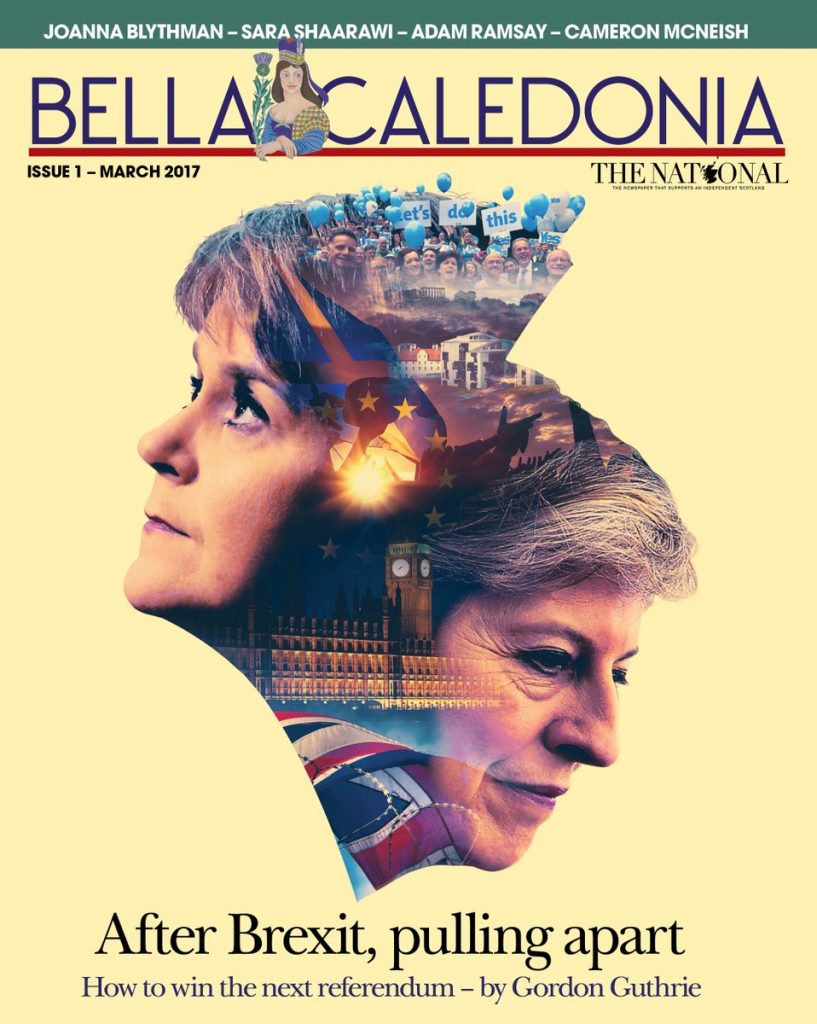

Gordon Guthrie on ‘After Brexit’. This is an extract from his new book Winning The Second Independence Referendum – a manifesto for Scotland and the EU after Brexit. Gordon Guthrie argues that the SNP must simply ‘remain firm whilst the UK shakes itself to pieces, a island of stability in a sea of change.’: “It is my opinion that Scotland will become independent on the same day that the rUK leaves the European Union: around Xmas 2018. But the ball is not in Scotland’s court – the dynamic that is ripping the UK apart remains English nationalism and the disintegration of the old continuing English constitution.” Read it here.
Adam Ramsay on Scotland’s role in the world. “Ultimately, the case for Scottish independence lies in foreign policy. Everything else could be devolved without leaving the UK: tax rates, energy policy, social security, rights at work. But once Holyrood has the power to ratify international treaties, once Scotland has its own seats in the chambers of the UN and the Council of Ministers, once we can choose not to send the Black Watch into Westminster’s wars, that is when the threshold has been crossed. For me, this is the simplest reason that I would prefer independence to devo-max or federalism. As I said to people repeatedly throughout the referendum, I can see the case for a nationalised rail company being part owned and co-managed by the governments of Scotland and England together. I can understand why archipelagic pooling of university research funding makes sense. But why on earth is foreign policy the one thing you’d want to leave to a neurotic post-imperial Whitehall, fumbling to find its role in the world?”
Joanna Blythman on the Errington Cheese case – and the wider implications for small-scale food producers and Scottish food culture. Read it here.
Playwright Sara Shaarawi from the Workers Theatre writes about her new Kickstarter, Megaphone.”We are limiting ourselves through our lack of diversity. I think that the struggle for what Scottish theatre is, or can be, has to be greater. I know that lack of diversity isn’t a new problem in theatre, but it became a glaringly obvious problem in the aftermath of Indyref. Scottish theatre, like Scotland itself, is in the throes of an identity crisis. In the lead up to the referendum I found myself watching a country gaining confidence in itself, in what it could be, and the theatre being made at the time was reflecting that.”
*
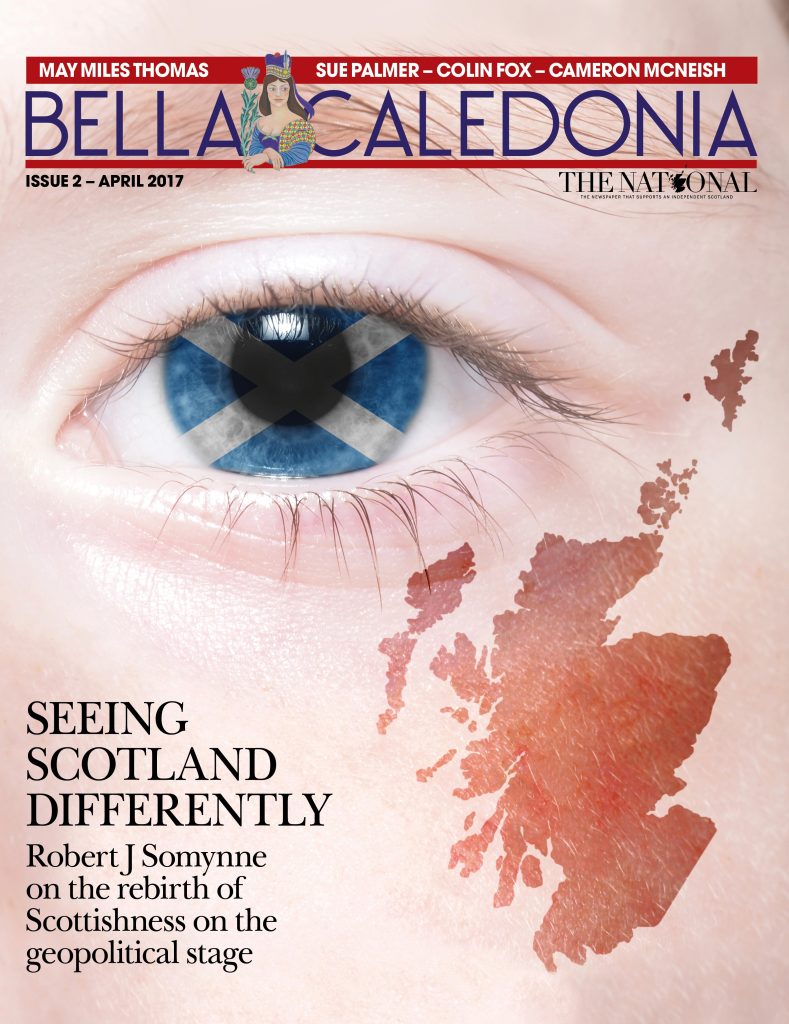

May Miles Thomas cutes through the endless debate about a Scottish film studio with an coruscating take on film and creative Scotland: “How many feature films are there in production led by a Scots producer? Not a single one. May Miles Thomas argues that if that was true in theatre, art, literature or any other art form it would be a national scandal. So why does the arts media keep celebrating a Scottish film industry thst doesn’t exist?”
Read Hail the Epic Fail here.
Robert J Somynne on Seeing Scotland Differently: “Something curious has happened over the past three and half years amongst the diplomatic circles of Europe and further afield. A force came into being that had previously not existed save in the imaginations of the most dedicated romantic. Scotland the geopolitical. For the first time, its unique political existence, separate from the rest of the UK was undoubtedly beginning to be fully appreciated. It is realised by all but the most dedicated of its defenders, that the British state is no longer a structure capable of culturally, politically and economically representing the interests of Scotland.”
Sue Palmer on the need for a radical shake-up of Scottish primary education: “Scottish children are now among the least active in the world, with fewer than ten per cent of four-year-olds achieving the recommended level of activity. This sedentary lifestyle has obvious implications for physical health but – especially in early childhood when they’re establishing lifelong habits of behaviour and predispositions – lack of active play can also have damaging consequences for mental health.”
Read: How We’re Making our Children Ill (and what we can do about it) here.
‘The old order is dying and the new one is struggling to be born’. Colin Fox on the events to mark the 80th anniversary of the death of the influential Italian thinker, linguist and Communist revolutionary Antonio Gramsci [1891-1937].
*
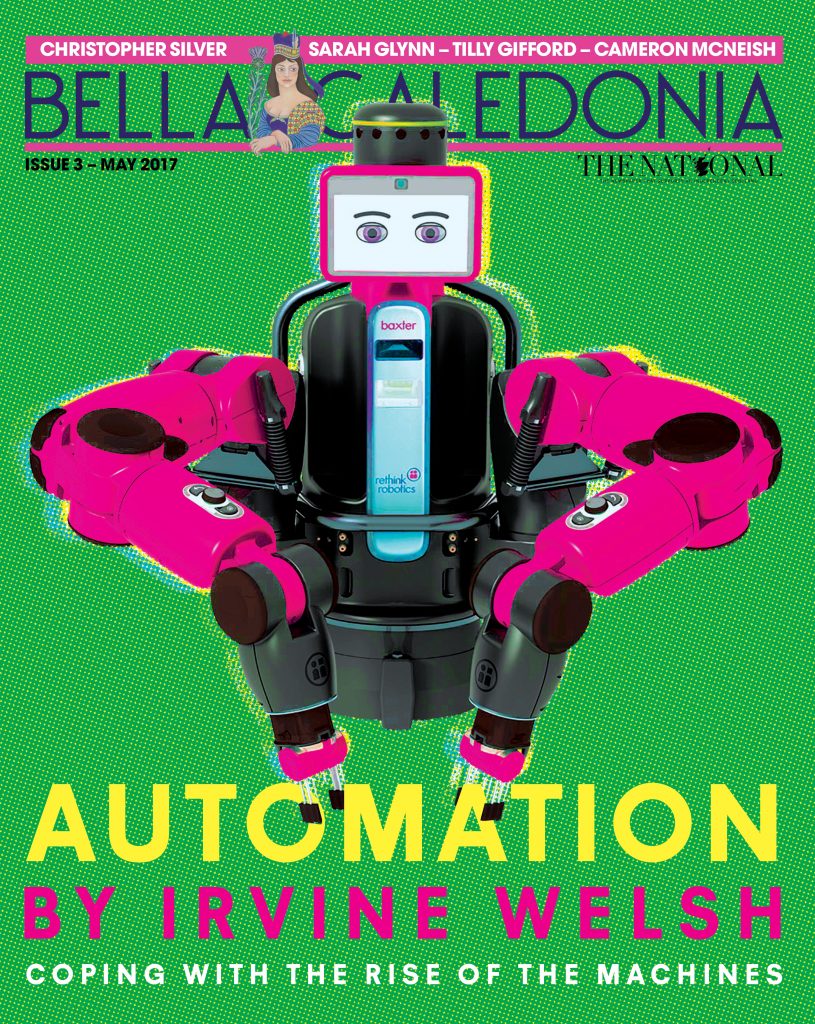

Irvine Welsh on the coming automation: “The media and politicians will often blandly inform us that we are living in unprecedented times, usually without any real explanation of what this actually means. The basic answer, that we are approaching a technologically driven end of capitalism, doesn’t on its own suffice. We have to look at the changing relationships between key factors that characterise this inchoate era. One of the most important of these is automation, and its recently altered association with productivity and employment.”
Read Automation here.
Sarah Glynn on the battle against benefits culture: ‘Every day brings another story of the brutal impact of benefit cuts. You might think that we would be developing compassion fatigue. That this has not happened is a testament not just to a fundamentally caring society, and the realisation that the next victim could be closer to home, but also to a recognition that none of this is inevitable. The destruction of the welfare state, and the exposure of the working class to unregulated market forces, is a deliberate policy that can and must be resisted. It is this recognition, as well as the very widespread impact of the attack on welfare, that has ensured that the call to end benefit cuts has risen up the political agenda. That call has always maintained a central place in Independence rallies, and has always received a warm response from people who want the opportunity to prove that we could organise things better.”
Tilly Gifford on the scandal of under cover Policing – and the need for a public inquiry in Scotland. Read Spycops here.
Christopher Silver on the British crisis and inter-generation wars: ““The “strong and stable leadership” pitch divides the old from the young more than it divides Remainer and Leaver. It is an appeal to deference and to those generations who still benefit from the fruits of the post-war settlement. The concept of strength and stability, to the precariat generation, is absurd. It is the opposite of everything that their experience adds up to.”
Read Stability for the Precariat here.
*
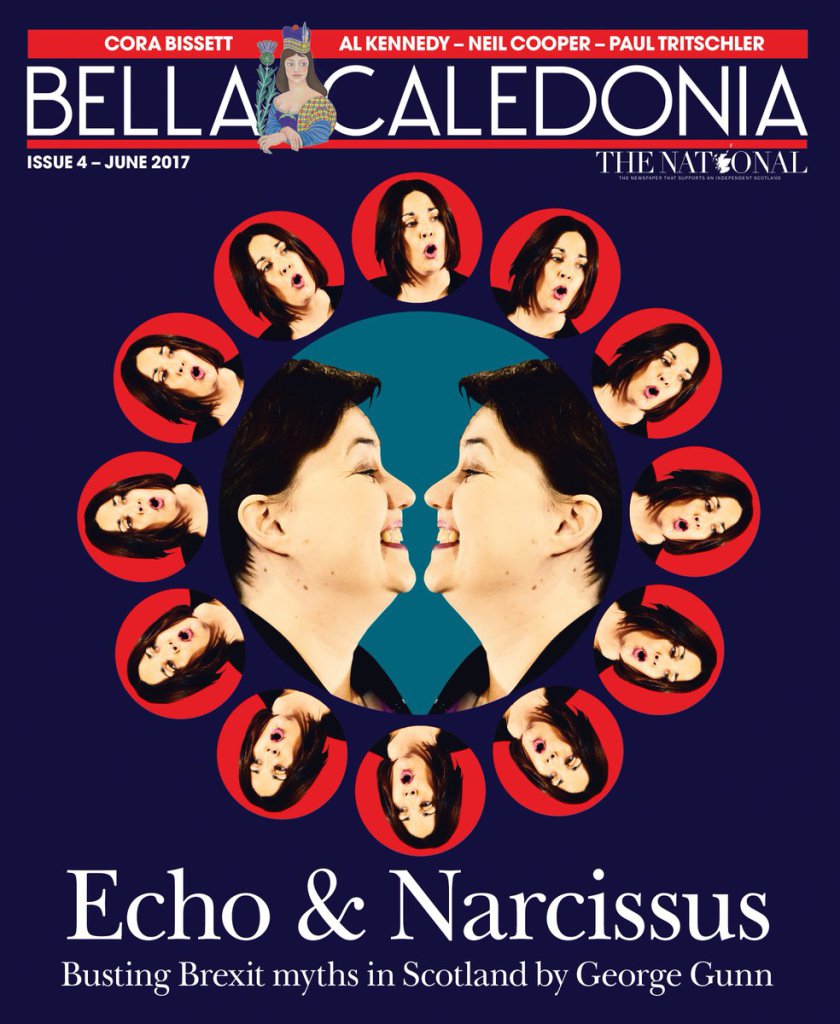

AL Kennedy on Nowhere Land: “So I am a citizen of Nowhere. Intellectually, culturally and as member of my species, I am and must be a citizen of the world. This is simply logical and a matter of self-defence. As Primo Levi, one of the consciences of Europe, tells us “Many people – many nations – can find themselves holding, more or less wittingly, that ‘every stranger is an enemy’. For the most part this conviction lies deep down like some latent infection; it betrays itself only in random, disconnected acts, and does not lie at the base of a system of reason. But when this does come about, when the unspoken dogma becomes the major premise in a syllogism, then, at the end of the chain, there is the Lager.” To be in any sense healthy, I must be a citizen of the world. I belong to that Nowhere.” Read the full article here.
Neil Cooper on ‘The Writing on the Wall – The Last Nights of Studio 24’.
Neil explores the war against ‘audible music’ that has been waged against live music in the capital for several years as venue after venue faces closure; the Bongo Club, Calton Studios, the Venue, and dozens more. What chance is there for culture in the supposed ‘festival city’ with developers circling? Read the full article here.
Paul Tritschler on ‘Hopeful Things’. How do we as Raymond Williams suggests find ways of ‘making hope practical, rather than despair convincing.’
“The struggle for socialism, expressed as solidarity with the poor, and the demand for common wealth, health, homes and happiness, begins with love for others; for what, other than love, could possibly be its driving force?”
Cora Bissett; a look ahead to the Fringe’s Made In Scotland showcase.
*
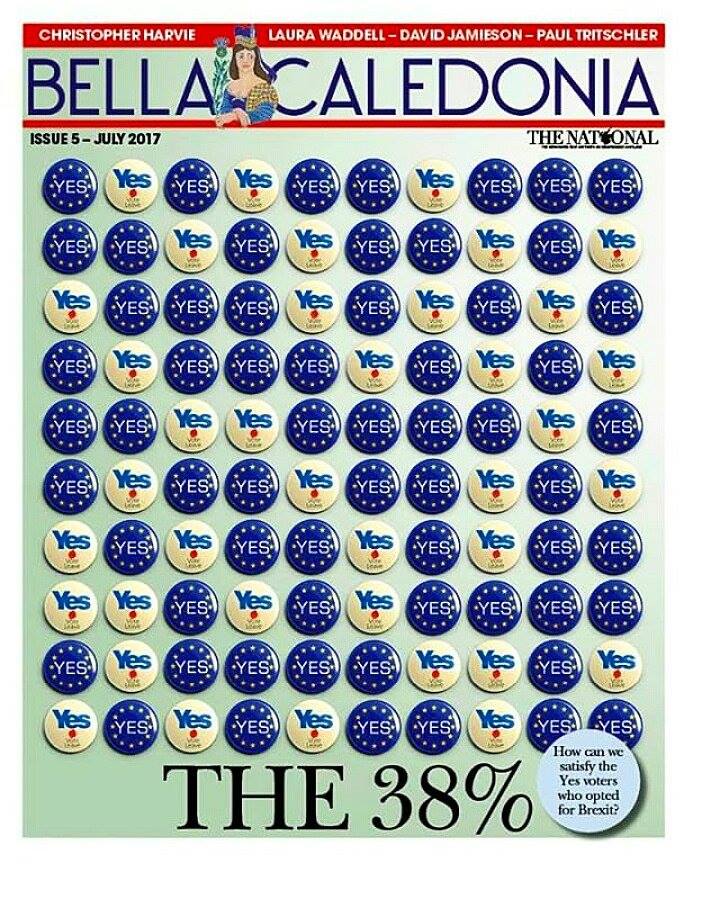

David Jamieson explores a Scottish Euroscepticism. Taking an unpopular view Jamieson argues: “Here in Scotland, as in other parts of Europe, another kind of EU confusion abounds…Thirty eight per cent of 2014 Yes voters voted leave in 2016. If this has been misunderstood by figures in the SNP party machine, which has long tied the concept of Scottish independence with the country’s membership of a wider union of European nations, it should not be lost on the independence movement.”
Read the full article ‘Eutopia Lost’ here.
Christopher Harvie on superyachts and oligarchs, big data and soft power. The covert tech and offshore power of the floating super rich. Read the full article here.
Laura Waddell on the structural and psychological barriers to working class women and the arts: “Our stories are seldom told; working class fiction has seen some small bubblings of popularity, perhaps last fashionable in a limited way in the 90s, but for the most part, ranging from the glossy catalogues of publishers across the UK to what’s covered on civilised radio review, working class stories are disproportionately absent. I have read a lot of fiction straight from luxurious writing retreats; I have read almost none from housing estates such as the one I grew up on. These stories are missing, from shelves, and from the record. And further to this absolute travesty, for the sake of recording people in their multifaceted depths, broadening outlook, and for the integrity of literature itself – all the stories that might be missing, all the great works of literature that we might never read, or may never even hear about (because an editor cannot see its merit, or assumes there is no appetite,) even fewer of these stories appear to be by women.”
Read ‘Against Stereotypes: Working Class Girls and Working Class Art’ here.
Paul Tritschler on change and inertia: ““Change is healthy. It renders the familiar unfamiliar and invites us to think differently about life, to reflect on the strangeness of things, and to consider what was, what is, and what might yet be. Revolution ought really to be a more appealing and exciting idea than slow and gradual reform – far less the prospect of strong and stable sameness. So why are we so blind to change and so stuck in our ways – is it the need to feel some level of control or security that drives us along well worn routes?”
*
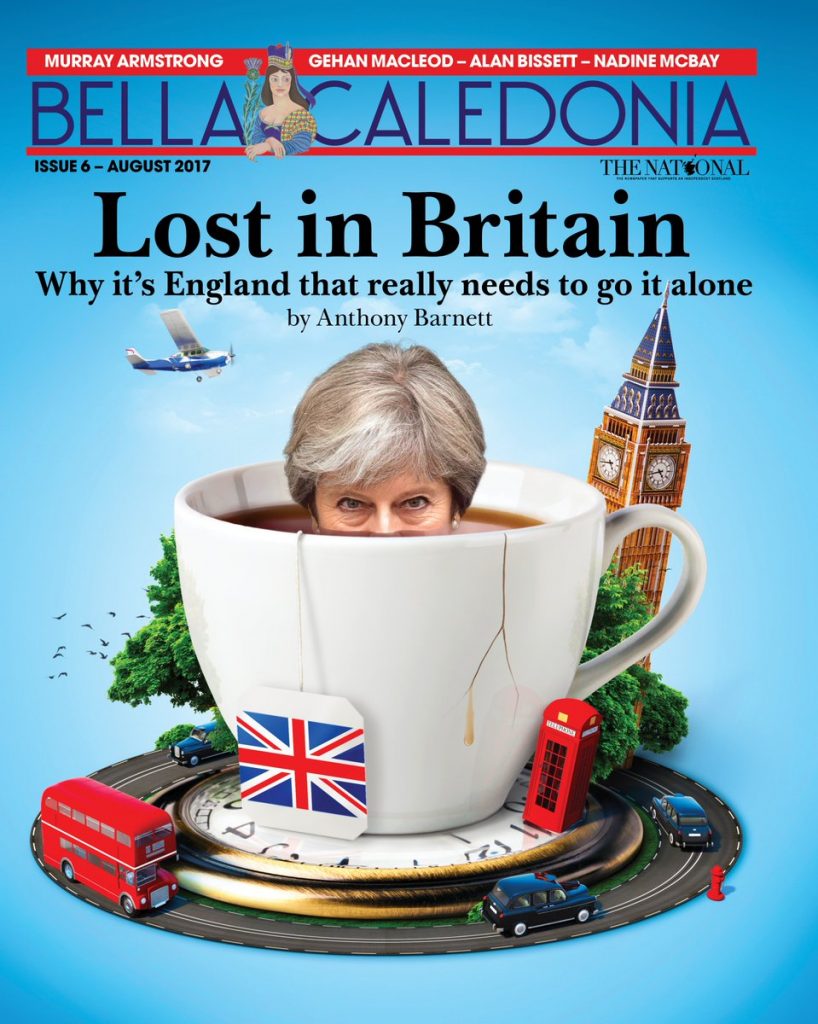

Anthony Barnett on the ‘Anglo-British nationalism that drove us to Brexit: “Think of it as the people living in the debris of their land, watching on their screens the new skyscrapers of London rise and shine. The debris is not poverty or lack of money but something intangible and inescapable: the end of Great Britain. They’d love to have it back but know they cannot and should not. Theresa May pitches them her Global Britain in its place, to feed their ambivalent desire. In doing so this most English of premiers, a vicar’s daughter from rural Oxfordshire, drives straight to the heart of the longing.”
You can buy his book The Lure of Greatness: England’s Brexit and Trump’s America here.
Gehan MacLeod In an important piece, Gehan Macleod explores the differences between charity and solidarity (charity is vertical, solidarity is horizontal) and reflects on twenty years of collective experience with GalGael working with wood and building boats in the practice of craft in building community. In a world full of endless opinion, listen to the people who do stuff.
Read GalGael 20 Years On here.
Murray Armstrong argues that:
“The existence of Thomas Muir and the radical movement which swept Scotland in the summer of 1792 is gradually becoming better known and accepted as part of our collective story.” He remembers the summer of 1792 when “Scotland experienced an astonishing burst of political activity with the call for a vote for every man in the country, and election of members of parliament every year. It was a popular response to the corruption, nepotism, favouritism and elitism of landowning nobles who controlled the nation’s parliamentary representation at Westminster.”
Read On the Trail of Thomas Muir here.
*
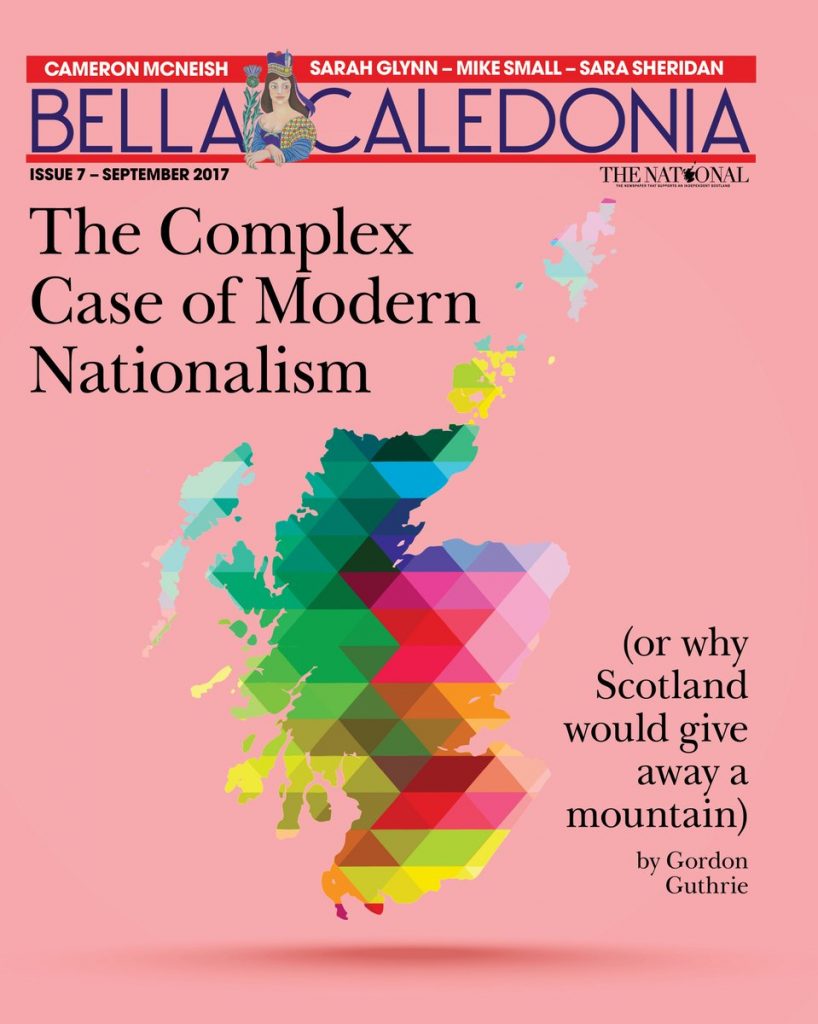

Sara Sheridan on Memory, Scent and Feminism: “As a historical novelist my job is to evoke era. It’s not enough writing about the past, a book has to be a time machine that can take you there. The means of doing so are often not about traditional, written history but are experiential. What did 1830 smell of? What did wearing a bodice feel like? It occurred to me that if I wanted to memorialize women, statues might not be the best way…”
Read Scents and Sensibility here.
Gordon Guthrie on The Complex Case of Modern Nationalism : “the age of nationalism, of all those sorts of nationalisms, as we have known them, is drawing to an end. We see that in Scotland. No echt 19th or 20th century nationalist movement would have accepted the native-born being out-voted by the ‘foreign’ born as the Scottish national movement did in 2014. That meekness (or quiet strength) holds the clue to the future ..”
Sarah Glynn tries to unpick the fine line between anti-Zionism and anti-Semitism and the distorting lens of online politics.
“The growth of unsubstantiated ‘news’ on the internet has vastly outpaced development of our critical faculties. We have learnt to approach government reports and stories in the mainstream media with a scepticism born of experience, and informal social media has helped us see through the official narratives. But alternative sources are often not treated with that same scepticism. Progressive activists, sickened by official propaganda and well-versed in the underhand machinations of outwardly respectable governments, are on the lookout for alternative sources of information and alternative explanations of the powers acting behind the scenes. We are only just beginning to realise the extent to which the internet has become a breeding ground for the confusions and deliberate deceptions of everyone who has a theory to propagate, a prejudice to share, or a political axe to grind. If a story appears to chime with known events it can be seized upon only too readily, especially if it has explanatory power. People with little previous political experience can prove particularly vulnerable.”
Read a Tangled Web here.
Mike Small: “History matters. It tells us something of who we are and who we want to be. The infrastructure and symbolism of our public life – our streets and public space – our commissioned public art and our monuments and relics matter. The statues we preserve and protect aren’t just historical artefacts, casual remnants of the past hanging about, they are immutable power rendered in stone…”
Read Hacking History here.
Sara Sheridan on memory, scent and feminism – celebrating historical women through perfume: “As a historical novelist my job is to evoke era. It’s not enough writing about the past, a book has to be a time machine that can take you there. The means of doing so are often not about traditional, written history but are experiential. What did 1830 smell of? What did wearing a bodice feel like? It occurred to me that if I wanted to memorialize women, statues might not be the best way.”
Read Scent and Sensibility here.
*
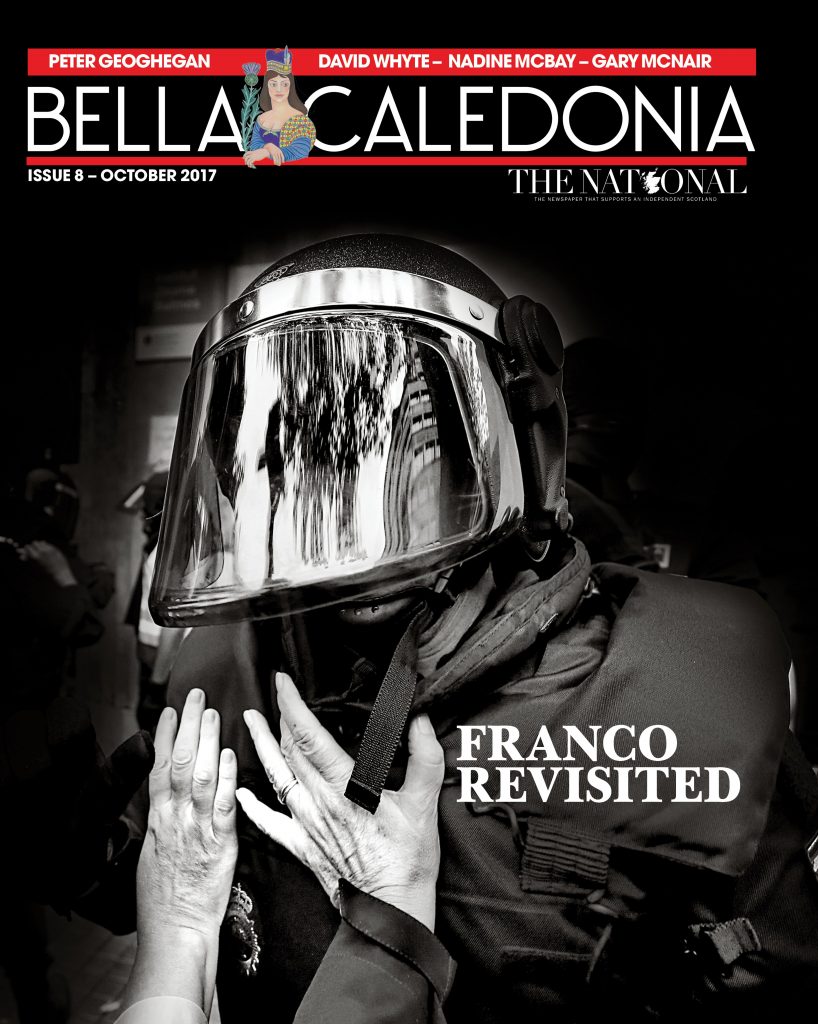

Slash and Burn – David Whyte on Spain’s return to Francoist repression: “In the constitutional crisis that is likely to rumble on for sometime now, Spain will certainly not recognize the legitimacy of Catalonia’s independence. The tyre-slasher state is certain to attempt some form of repression. The Guardia Civil has not left Catalonia, and indeed the extension of the permit for the loony tunes cruise ships in Barcelona harbor yesterday is one indication that there could be an attempt to continue the occupation.”
In Catalonia We Should all be Careful What we Wish For – Peter Geoghegan: ” In using brute force to disrupt a visibly non-violent vote – even one banned by the courts – Madrid lost its legitimacy to speak on Catalonia’s behalf.”
Beyond Taboo – Nadine McBay celebrates the start of the Scottish Mental Health Arts exploring the very different pressures affecting men and women’s mental health and the ways forward. Interview with Mariem Omari.
*
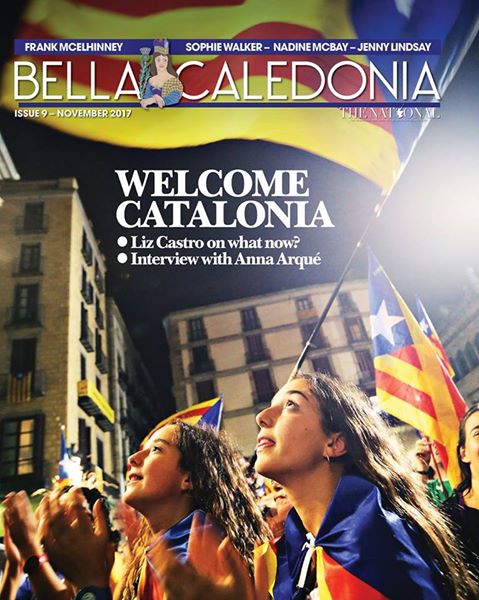

Postcards from Scotland in a Time of Crisis – by Frank McElhinney.
Scottish artists and innovators were at the forefront of the technology that brought photography to the world.
McElhinney has said:
“The photographs are in a faux vintage style mimicking the plate cameras of the late nineteenth century when commercial photographers George Washington Wilson (Aberdeen) and James Valentine & Sons (Dundee) ran successful businesses selling prints and postcards that helped shape the world’s visual image of Scotland. On the back of each of my postcards is a line of text that states a fact about the place that offers a small jolt of realisation. The overall effect is intended to lead us to question our own self image of Scotland and to think about the kind of Scotland we want post-Brexit and potentially post-Independence.”
How to Tackle Gender Inequality by Sophie Walker: ”
It’s that power imbalance that we have to tackle if we are to end violence against women. But it’s that same power imbalance that has forced the initial debate about this down a cul de sac by focussing almost entirely on the victims and what constitutes a victim. And from there, very quickly and with tedious predictability, into the victimisation of men by harpies and hysterical women – myths as old as time.
Don’t get me wrong: We have to support survivors of violence and we have to support women to report violence against them. It is abundantly clear that Westminster has little or no HR functions and that the shaky reporting systems in place are woefully inadequate – politically flawed, practically useless. The institution and all parties must put in place independent, third-party reporting systems so that women do not have to tell their stories to superiors or line managers or political allies of the men who have groped and assaulted them. Safeguarding training for all staff is needed. As is a formal policy on dealing with sexual harassment.”
Saving the Republic by Liz Castro:
“Look at what happened on October 1st. For months all of the Spanish government from Rajoy through Soraya to every other unionist politician, in Madrid and in Catalonia, swore there would be no referendum. They did everything they could think of to keep it from happening. They confiscated “democracy” posters, they shut down innocuous informational government websites, they arrested government officials, stole literally millions of ballot papers, threatened pollworkers with 300,000€ fines, relentlessly and fruitlessly hunted for ballot boxes, and as the coup de grace, sent riot police to 92 polling places, some in towns with populations as small as 200, to beat up peaceful waiting voters who responded by putting their hands in the air, and chanting “we will vote, we will vote”. And still they failed to stop the vote.”
*
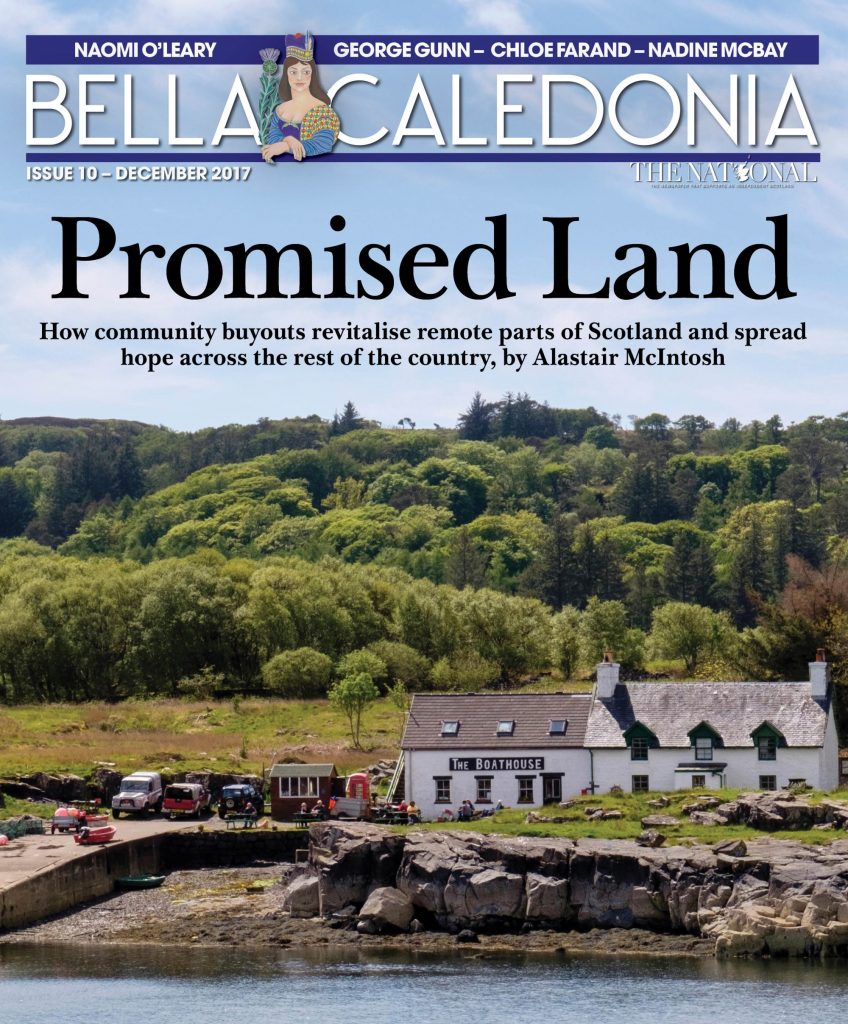

The Promised Land by Alastair McIntosh: “Community buyouts elsewhere suggest that there are four main driving forces that help land reform to be successful. These are:
- Social housing with secure tenure and housing plots can be created at low cost. This eases worry and economic pressures on young families, leading to benefits that are monetary, that affect child welfare, and are conducive to improved mental health.
- Business units and business opportunities can be set free, stimulating entrepreneurial initiative.
- Agricultural potential, ecological potential, sporting assets and renewable energy can be harnessed for the common good. For example, Eigg now gets 90% of its electricity from a local hydro, wind and solar grid, with only 10% of diesel backup. This reduces the carbon footprint of rural lifeways.
- There are a range of psychological, creative and spiritual benefits. Community structures – when well held and with support from groups like Community Land Scotland – create contexts where people grow. This includes learning how to recognise and process conflict. It includes learning, or relearning, how to take responsibility for both self and neighbours. It is from such qualities that nations grow in strength and gentleness.
Hope, for what, is hope for a better way of being human in the world.”
The Merkel Effect. Chloé Farand in Berlin explains the fallout from the political crisis in Germany: “The message could not be clearer: Merkel will remain a crucial player in the Brexit negotiations and for the EU, this is business as usual.
If Brexit is largely irrelevant to the coalition talks in Berlin, the future of the European project isn’t. The German political deadlock is directly threatening Macron’s bold political reform to renew the EU with at its core a strengthened Franco-German alliance.”
The Theatre of Humiliation by George Gunn: “As the ungainly farce of Brexit blathers to its inevitable conclusion, now that Theresa May has set the date for leaving the EU – 29th March 2019 – and bowed low to the inevitable cash settlement for the European divorce bill which will be £50 million (although it could rise to £90 billion or more, as it is an ongoing negotiation) – it is timely that the Scottish theatre community is in full panto-mode, to set the scene for January next year when Creative Scotland will announce just how the financial wheels are coming off the cultural wagon. To conflate arts funding and the cliff cascading exercise that is Brexit may seem to many to be flippant, if not downright perverse, but I think the two are intrinsically linked. Both these things are unnecessary, and both are tragedies for Scotland.”
A Wake Up Call by Naomi O’Leary: “Brexit has exposed profound ignorance, indifference, and retrograde beliefs towards Ireland in the United Kingdom.
There was the description of Ireland by the UKIP MEP Gerard Batten as “a tiny country that relies on UK for its existence”. There was MEP Daniel Hannan’s paternalistic dismissal of Irish sovereignty.
Conspiratorial tabloid pronouncements about Fine Gael courting Sinn Fein voters – an obvious absurdity to anyone familiar with Irish politics – leaked into Westminster chatter.”
